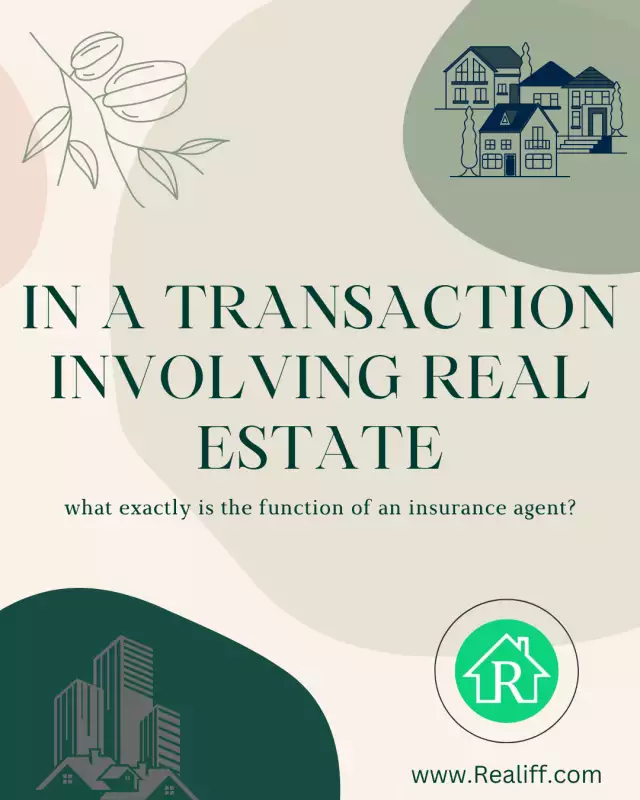Which career path is better for you: real estate agent or insurance agent?
Which career path is better for you: real estate agent or insurance agent?
A sales job is a challenge since most people cringe at the thought of cold calling, roadshows, or presentations to promote a product or service.
However, selling is a fantastic experience that everyone should have at least once in their lives.
The confidence to approach a stranger and strike up a conversation, or the ability to persuade someone successfully, are skill sets that will help you in all aspects of your life.
Shyness and timidity have no place in our souls if we want to reach high heights.
However, when it comes to sales occupations with boundless revenue potential, property and insurance are usually the first two that come to mind.
Among the numerous options available, the real estate and insurance industries stand out as the most popular due to career benefits such as having a flexible schedule and being their own boss.
A profitable journey awaits you if you are prepared to work hard and smart, potentially earning you a five to six-figure commission every month. This has happened many times, even for individuals in their first year of operation.
And that is well within the pay range of normal high-earning professionals such as lawyers, doctors, and C-Level executives who may have been in their fields for decades.
Not too bad isn’t it?
Of course, there are many who do not succeed, and no one can promise your success in either profession; but, the probabilities are comparable to any other industry.
So, what are the main distinctions between a real estate and an insurance agent career?
Both real estate agents and insurance agents are sales professionals that specialize in selling various products and services.
They share many responsibilities yet have distinct variances.
There are some ways that real estate agents and insurance agents are the same.
Age Requirement:
To begin, you must be at least 21 years old.
Career Courses & Qualifications:
Being a real estate or insurance agent necessitates taking necessary courses as well as obtaining professional certifications and licenses.
To work in real estate, you must take and pass the Real Estate Salesperson Course and Exams.
To be eligible for insurance, you must pass all four SCI papers (Singapore College of Insurance).
Flexible Schedule:
If you're tired of the 9-to-5 grind, becoming a real estate agent or insurance agent allows you to work from home.
You will be free to set your own hours. That also means you'll have to work on weekends or public holidays because that's when your clients are most likely to be available.
Income Type:
Both professions do not get a fixed salary and their earnings are primarily commission-based, allowing them to make a significant profit on a small number of sales.
Marketing:
Aside from meeting and servicing customer portfolios, both agents are in charge of advertising and marketing their services in order to build their business and increase their networks.
However, due to the requirement to advertise across many channels, property brokers typically incur higher marketing costs than insurance agents.
Paperwork:
When a deal is finalized, they must fill out the documentation for clients and retain records.
Property transactions, in my opinion, have less complicated paperwork than insurance transactions.
Need to Work Well Independently & With Others:
When they first start out, many real estate agents and insurance agents join experienced mentors in established companies since mentoring, training, and technical assistance are crucial for a rookie.
Both occupations are typically one-man shows that operate various areas of a regular firm such as marketing, administration, sales, customer service, and everything in between.
It is critical to have strong team support when competing in the industry.
As a result, it is critical to be a good team player, cooperating with others and watching each other's backs.
The longer you work in sales, the more you will realize the following:
You can run fast by yourself. To go far, you must run as a group.
Communication Skills & Personal Bearing:
Whether you're selling a million-dollar home or hundreds of thousands of dollars in insurance coverage, all customers want someone they can trust and talk to.
As a result, a trustworthy agent with excellent communication skills and domain understanding is essential.
Dressing and grooming yourself effectively is also a crucial element of first impressions because it influences how others perceive you.
What Is the Difference Between a Real Estate Agent and an Insurance Agent?
Education Qualifications
Real Estate Agent:
4 GCE 'O' Level passes or equivalent are required (taken at not more than 2 sittings).
Insurance Agent:
GCE 'A' Level certificate with passes in at least three subjects at "Higher 2" level and two subjects at "Higher 1" level; an International Baccalaureate Diploma qualification; a diploma awarded by a Singapore polytechnic; or any other academic qualifications equivalent to the GCE 'A' Level certificate.
Products
Real Estate Agent:
A real estate agent might opt to work on all types of properties or specialize, such as new property sales, HDBs, landed properties, ex-pat relocation, or commercial properties.
If they are focusing on resale properties, they must find their own inventory.
Insurance Agent:
Insurance agents can also specialize or work as generalists, offering a wide range of policy-type products ranging from savings to hospitalization plans, as well as investment-linked products and endowment policies.
Insurance agents, on the other hand, do not need to acquire inventory because their products are policies created by the corporations with whom they are linked.
Commission & Compensation
Real Estate Agent:
A typical rental arrangement would pay an agency 1-2 months' rent in compensation and may be renewed annually, with the agent earning renewal commissions every year or two.
Some top brokers even engage personnel to manage their portfolio of lease renewals, which number in the hundreds every year and continuously bring them a healthy 6-figure income.
A typical property sale will net an agent 1-2% commission on resale homes and 2-4% commission on new properties. This suggests that the sale of a million-dollar home could result in a $10K-40K profit.
Take note, however, that co-broking (sharing amongst agents when they refer clients to each other) may be involved at times, and therefore this sum may be split between them.
To earn $100,000, a Property Agent would need to close ten one-million-dollar home sales per year (assuming a 1% commission per sale) or just one four-million-dollar home sale per year (assuming a 2.5% commission per sale).
It is conceivable and typical for property brokers to earn six figures in their first year of business. The most successful may even earn six figures per month.
Insurance Agent:
Insurance agents are compensated based on the products they market, which include Whole Life, Endowment and Term, Accidents and Investment Linked Policies, and so on.
Each product has its own payment plan, and agents are often given a higher First Year Commission (FYC), followed by smaller annual renewal commissions.
Some plans, such as personal accidents, may even provide lifetime renewals.
In addition, insurance advisers can receive bonuses and long-term incentives along the road.
After-sales service
Real Estate Agent:
To continue communication, good real estate brokers often meet with their clients in person at least once or twice a year after completing a deal, or send them regular market information.
Great real estate brokers even have a system in place to contact customers who did not purchase from them (This might be similar for insurance agents too).
Unless obliged to relay conversations between landlords and tenants, rental agencies will normally have to keep in touch 1-2 times over the course of the lease.
Insurance Agent:
In the insurance market, after-sales support is crucial.
Annually, insurance agents must analyze their clients' policies and financial conditions in order to recommend additions and changes to their coverage.
They would also have to assist their clients in filing claims during difficult circumstances.
Opportunity to Travel
Real Estate Agent:
Property agencies are sometimes appointed by property developers to market new launch projects abroad.
This means you may have the opportunity to travel, learn about foreign markets and expand your overseas clientele base.
Insurance Agent:
The chances of an insurance agent working abroad are slim.









